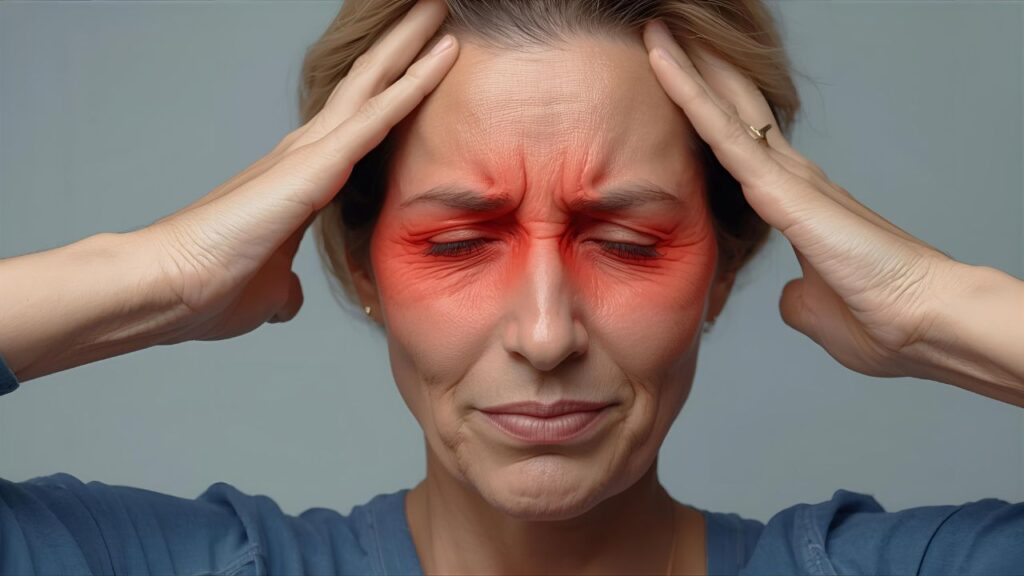Can menopause cause dizziness?

If you’re navigating perimenopause or menopause and you’ve noticed that unsettling sense of dizziness, light‑headedness or imbalance… you’re absolutely not imagining it. These sensations matter. They’re your body’s way of signaling that something in your hormonal, nervous‑system or balance system is shifting. And while you may have expected hot flashes, mood swings or night sweats, dizziness can be one of those sneaky symptoms that slips under the radar.
Here’s what you need to know right upfront:
- The transition into menopause (and the years around it) involves major hormonal fluctuations, particularly in estrogen and progesterone. These hormones do so much more than regulate your cycle—they influence brain chemistry, blood vessel tone, inner‑ear/balance mechanics, blood‑sugar regulation, and more.
- Because these systems are interconnected, when one shifts (like estrogen dropping), it can spark ripple effects throughout your body. One of those ripples can be dizziness, light‑headedness, or feeling off‑balance.
- Importantly: this doesn’t mean that every dizzy spell you have is “just menopause.” Many other things can cause dizziness too, which is why understanding the menopausal link is valuable, but so is ruling out other causes.
- The good news? Knowing the “why” gives you power. You can implement targeted lifestyle, hormone‑aware, balance‑supporting strategies to dramatically reduce or even eliminate these dizzy spells—instead of simply accepting them as “part of aging.”
In the sections ahead, we’ll explore how menopause can lead to dizziness, the mechanisms behind it, the risk factors, when you need to be cautious, and most importantly what you can do to feel steady, strong and vibrant again. Let’s get started.
How menopause (and perimenopause) can lead to dizziness
Here are the main biological and physiological pathways through which the menopausal transition can contribute to dizziness or light‑headedness. Many work in combination—so it’s rarely just one thing.
1. Hormonal fluctuations and inner‑ear / balance system changes
- Estrogen isn’t just a “female hormone” for reproduction—it has receptors in areas of the brain, in the inner ear (vestibular system) and in blood vessels. During perimenopause and menopause, estrogen levels drop and fluctuate more.¹
- The inner ear (vestibular apparatus) communicates balance and spatial orientation to the brain. If hormonal shifts affect the ear’s fluid, signalling or small crystals (otoliths) as some research suggests, that can trigger sensations of unsteadiness or vertigo‑type dizziness.²
2. Blood pressure / circulation / orthostatic changes
- As estrogen drops, your blood vessels may lose some of their flexibility, and your autonomic nervous system (which regulates things like blood pressure, heart rate, standing up) may become less resilient.³
- Specifically: when you stand up quickly, your brain may temporarily receive less blood flow → light‑headedness/dizziness (orthostatic hypotension).⁴
3. Blood sugar / metabolism
- Hormonal shifts also affect insulin sensitivity and glucose regulation. If your blood sugar dips, or you have irregular meals, you may feel dizzy or faint.⁵
4. Hot flashes, night‑sweats and dehydration / fluid‑loss
- Hot flashes cause sudden vasodilation (blood vessels opening) and sweating — both affect blood pressure and fluid volume. That can contribute to dizziness.⁶
- Also, fluid loss plus not enough replenishment = even mild dehydration can reduce brain perfusion and cause “woozy” feelings.
5. Sleep disruption, stress/anxiety and nervous‑system vulnerability
- Poor sleep (common in menopause due to night sweats/hormonal change) → fatigue → impaired nervous‑system resilience → more prone to dizziness.⁷
- Anxiety or panic attacks (which may increase during this transition) can trigger dizziness via hyperventilation, increased heart rate, adrenaline surge.⁸
Risk factors & when this is more likely
Here are extra “red flags” or risk‑amplifiers—good to know if you’re wondering “why is this happening to me (and maybe not to the friend next to me)?”
- If you’re in your late 40s to early 50s (the typical perimenopause/menopause window), the risk goes up.⁹
- If you have frequent hot flashes/night sweats, intense hormonal symptoms, heavy cycle shifts—you may be more prone to dizziness.
- If you’re dehydrated, have skipped meals, consume large amounts of caffeine or alcohol, or have irregular sleep—these lifestyle factors amplify the effect.
- If you have existing cardiovascular issues (blood‑pressure variability, arrhythmias), inner‑ear/balance diagnoses, diabetes/blood‑sugar dysregulation, or are on medications that affect blood pressure/vestibular function—then dizziness during menopause might be more pronounced or have multiple causes.
- Smoking or high body‑mass index (BMI) were also flagged as risk amplifiers in some reviews.¹⁰
When dizziness is not just menopause—and deserves prompt evaluation
While menopause is a strong suspect when dizziness emerges in the right context, it’s vital to recognize when urgent or additional medical evaluation is needed.
If any of the following occur:
- Dizziness associated with chest pain, shortness of breath, palpitations or fainting.
- Dizziness with sudden hearing loss, ringing in the ear, numbness or weakness in one side of body, double vision.
- Dizziness that is persistent, getting worse, or interfering substantially with daily life (walking, driving, working) and doesn’t improve with basic interventions.
- New medications, recent surgeries, or other conditions that might explain it (e.g., severe anemia, low thyroid, vestibular disorders).
What you can do — a tailored, hormone‑smart protocol

Here’s your “Menopause Network Protocol for Dizziness in Menopause” — with friendly, practical, actionable steps you can start today (yes, today) to help reduce or eliminate these dizzy spells.
Step 1: Track & observe
- Start a symptom journal: note date/time of dizziness, what you were doing (standing up? turning quickly? after a hot flash?), what you ate/drank recently, your sleep last night, your hydration, your stress level. Patterns = your friend.
- Check your blood pressure and pulse when lying down, sitting, standing (especially if you suspect orthostatic hypotension). If your provider agrees, you may track for a few days at home.
- Monitor blood sugar if you suspect dips (especially if you have diabetes or pre‑diabetes).
Step 2: Lifestyle supports
- Hydration: Aim for consistent fluid intake throughout the day. After hot flashes/night sweats, be sure to replenish with water plus electrolyte‑rich foods or drink (unsweetened coconut water or herbal tea + a pinch of salt) if needed.
- Meals: Eat regular, balanced meals containing protein + healthy fat + fibre (e.g., Greek yogurt + nuts + berries; grilled fish + veggies + quinoa). Avoid long gaps between meals and avoid highly processed/high‑sugar foods that can trigger blood‑sugar drops.
- Move wisely: When rising from sitting or lying down, take your time. Sit at edge of bed, hang feet over side, pause, then stand. This helps your circulation adapt.
- Balance & vestibular exercises: Gentle yoga, tai chi, single‑leg stands, slow head‑turns (left‑right/up‑down) can train your vestibular system and improve stability.
- Sleep hygiene: Create a cool, dark, quiet environment, consistent bedtime/wake time, avoid caffeine late, and alleviate night sweats (cool pillow, moisture‑wick bedding, fan). Good sleep = better nervous‑system resilience.
- Stress reduction: Incorporate meditation, deep‑breathing (inhaling 4 counts, hold 2, exhale 6), yoga, or nature walks. Chronic stress amplifies dizziness by triggering autonomic imbalance.
- Avoid triggers: Limit caffeine/alcohol (which affect hydration and blood vessels), reduce heavy meals/large fluid shifts, avoid rapid posture changes if you feel unstable.
Step 3: Hormone‑aware strategies (with your doctor)
- If your dizzy spells are clearly tied into the broader menopausal symptom picture (hot flashes, mood swings, sleep disruption), have a discussion about whether hormone therapy (HRT) or other hormone‑balancing interventions may be appropriate. Research suggests HRT may reduce incidence of certain inner‑ear/balance disorders in menopausal women.²
- But: Always weigh risks vs benefits (cardiovascular risk, breast cancer history, etc.). Personalized medicine matters here — your unique health history, risk profile and goals matter.
- Also check other labs: thyroid function, iron/hemoglobin (to rule out anemia), blood sugar/insulin, lipid/cardiovascular status, vestibular assessment if indicated.
Step 4: When and how to seek specialist support

- If vestibular (inner ear) issues seem likely (i.e., spinning vertigo, triggered by head movement), a referral to an ENT or vestibular therapist may help.
- If you have low blood pressure or heart/vascular symptoms, cardiology or autonomic specialist may be indicated.
- If you have significant anxiety/depression overlapping with dizziness, working with a mental‑health professional may improve both mood and dizziness.
Final thoughts — you’ve got this
Dizziness during the menopausal transition is real, valid and absolutely manageable. It doesn’t mean you’re broken. It means your body is going through a shift—and it needs your kindness, your awareness and your proactive support.
Here’s what I want you to remember:
- You don’t have to tolerate frequent dizzy spells as “just something I have to live with.”
- Understanding the hormonal, circulatory and vestibular links gives you enormous leverage.
- The combination of tracking → lifestyle support → hormone‑aware strategy is powerful.
- Your individual case matters—set up your team (your primary care provider/gynecologist, maybe an ENT or endocrinologist if needed) and craft the plan that’s right for you.
You deserve to feel steady. To walk with confidence. To engage fully in life without wondering “will I get dizzy now?” Let’s reclaim your footing—in body, mind and spirit.
Please remember: This information is for educational purposes only and is not intended to replace professional medical advice, diagnosis, or treatment. Always consult with your healthcare provider before making any changes to your health routine, especially if you have existing health conditions or are taking medications. What works for one person may not work for another, and your individual health needs are unique to you.
References
- Menopause Network. (n.d.). Dizziness or light‑headedness. Retrieved from https://menopausenetwork.org/symptoms/dizziness-or-lightheadedness/
- Healthline. (2023, April 14). Menopause & dizziness: Is it a symptom? Retrieved from https://www.healthline.com/health/menopause/menopause-dizziness
- The Vertigo Therapist. (n.d.). Hormones and vertigo. Retrieved from https://thevertigotherapist.com/hormones-vertigo/
- Medical News Today. (n.d.). Menopause and dizziness: Causes and treatments. Retrieved from https://www.medicalnewstoday.com/articles/319860
- Patient.info. (n.d.). What causes dizziness in menopause? Retrieved from https://patient.info/features/hormones/what-causes-menopause-dizziness-and‑how‑can‑you‑manage‑it
- Hone Health. (n.d.). Menopause, hot flashes, and dizziness: Causes & treatments. Retrieved from https://honehealth.com/edge/hot-flashes-and-dizziness/
- Vestibular Disorders Association. (2024, March 13). How does dizziness change with menopause? Retrieved from https://vestibular.org/blog/how-does-dizziness-change-with-menopause/
- The Menopause Network UK. (n.d.). Menopause and dizziness: What’s normal and what’s not. Retrieved from https://www.themenopausenetwork.co.uk/symptoms/dizziness-or-lightheadedness
- Global Women Connected. (2025, August 10). Menopause and dizziness: Understanding the connection and relief. Retrieved from https://www.globalwomenconnected.com/menopause-dizziness-connection/
- Menopause NOW. (2019). Causes of dizziness during menopause. Retrieved from https://www.menopausenow.com/dizziness/causes
